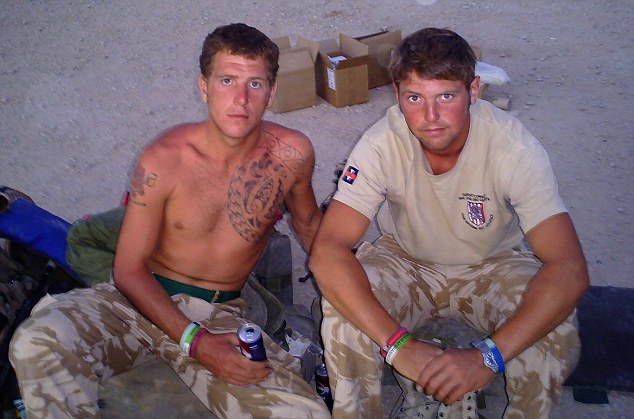- New study reveals impact of conflicts on UK's hard-pressed Armed Forces
- 1,472 new cases of troops needing treatment in first three months of 2012
- Female personnel twice as likely to suffer ill-health than male counterparts
- First figures compiled since launch of MoD's 'Don't Bottle It Up' campaign
By Mark Nicol, Daily Mail, 7 July 2012
Nearly 500 military personnel a month are
asking to be treated for traumatic disorders after serving in
Afghanistan and Iraq.
The impact of a decade of conflict on Britain’s hard-pressed Armed
Forces is revealed in new Ministry of Defence figures.
A study of the 1,472 new cases of Servicemen and women seeking help in
the first three months of the year shows some clear trends. Female
personnel are twice as likely to suffer mental ill-health, and lower
ranks are more vulnerable than officers.
The figures are the first to be compiled since the launch of the ‘Don’t
Bottle It Up’ campaign, an initiative by the Ministry of Defence
intended to encourage more soldiers, sailors and airmen to seek help for
mental or emotional issues.
The campaign is intended to break the stigma around these issues.
According to previous reports, soldiers have suffered ridicule and
contempt from their colleagues for admitting they are struggling to cope.
The findings by Defence Analytical Services and Advice, a research arm
of the MoD, found that soldiers serving two or more tours of duty are
six times more likely to suffer than those on one tour.
Concern for the veterans of these long campaigns is underlined by the
fact that more former servicemen have committed suicide since the 1982
Falklands War than died in battle, when 255 were killed.
Earlier this year, Lance Sergeant Dan Collins, 29, committed suicide. In
a note he described the guilt of surviving an incident in Afghanistan
that killed two comrades. Collins was found hanged in a quarry near his
home in Cardigan, West Wales.

Taking its toll: Earlier this year, Lance Sergeant Dan Collins (right) committed suicide over the guilt of surviving an
incident in Afghanistan that killed two comrades, including Lance Corporal Dane Elson (left)
The MoD found that across the Royal Navy,
Royal Marines, the Army and the Royal Air Force, reservists show higher
rates of mental problems than regular personnel.
Yesterday, a former reservist soldier described his struggle to be
diagnosed with post-traumatic stress disorder and to get financial
support.
Lance Sergeant Jake Wood, 39, left his job as a business analyst for an
investment bank to serve two tours of Iraq and one of Afghanistan.
He admitted: ‘In Iraq, I shoved my pistol into my throat. I wanted to
“check out”. Only my fears for my family stopped me. On the same tour,
in 2004, a local kid pointed a weapon at me and I was so depressed I
actually wanted him to shoot me.
Warning: Former Army Colonel Bob Stewart, MP for Beckenham, Kent, said
manpower cuts could trigger more cases of mental ill-health
Warning: Former Army Colonel Bob Stewart, MP for Beckenham, Kent, said
manpower cuts could trigger more cases of mental ill-health
‘I went to Afghanistan in 2009 and my mental and emotional health got
worse. I saw my mates die and we were outnumbered by the Taliban every
day.
‘It wasn’t until December 2010 that I got the package of treatment and
compensation I need. Getting help and support can be very difficult. I
needed really good doctors and lawyers. The Ministry of Defence fought
the case.’
L/Sgt Wood now receives 75 per cent of his salary at the time of his
mobilisation.
The Army is committed to cutting 20,000 soldiers before 2018. Many of
those made redundant will be veterans of Afghanistan and Iraq and their
places on the frontline are expected to be filled by reservists such as
L/Sgt Wood. Military charity Combat Stress warned that more must be done
to support reservists’ mental health.
Andrew Cameron, the chief executive of Combat Stress, said: ‘Reservists
are more likely to suffer post-traumatic stress than regular
counterparts because they spent less time among their peers and must
switch between the military and civilian communities quickly and
regularly.
‘It is very important as we increase our reliance on reservists that
these men and women are properly prepared and supported. This means
before, during and after their deployments. Combat Stress has created
two liaison officers to work specifically with reservists to ensure they
receive the support they require.’
The manpower cuts could trigger more cases of mental ill-health,
according to former Army Colonel Bob Stewart, MP for Beckenham, Kent. He
said last night: ‘Soldiers want to be treated among their own. They
always have done and they always will.
Today’s problems seem to be obvious and as more soldiers leave the
regimental system and find themselves in civilian life they will not
have their friends close at hand.
‘Only they really appreciate the difficulties of spending so long on the
frontline.’
The MoD said: ‘The mental health of service personnel is a top priority
and we have robust systems in place to identify and treat those with
mental health issues.
'We are also committed to reducing the stigma associated with mental
illness such as through briefing Service personnel, their families and
the chain of command.’
Source:
Daily Mail